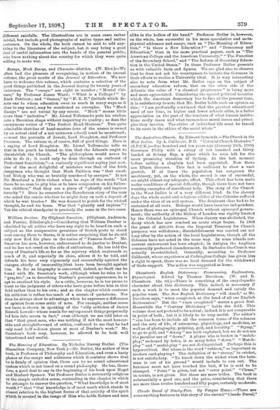The Meaning of Education. By Nicholas Murray Butler. (The Macmillan
Company, New York.)—Mr. Butler, the author of this book, is Professor of Philosophy and Education, and even a hasty glance at the essays and addresses which it contains shows that he is firmly of opinion that there can be no sound educational system which is not based on a sound philosophy. He has, there- fore, a good deal to say in the beginning of his book upon Hegel and Herbert Spencer. Yet Professor Butler is reverently religious in the simple orthodox sense, contending in the chapter in which he attempts to answer the question, "What knowledge is of most worth ? " that "that knowledge is of most worth which stands in closest relation to the highest forms of that activity of the spirit which is created in the image of Him who holds Nature and man alike in the hollow of his hand." Professor Butler is, however, on the whole, less successful in his more speculative and meta- physical addresses and essays, such as "The Meaning of Educa- tion," "Is there a New Education ? " and "Democracy and Education," than in his moss practical papers, such as "The American College and the American University," "The Function of the Secondary School," and "The Reform of Secondary Educa- tion in the United States." In these Professor Butler presents us with valuable facts and figures. We are glad also to observe that he does not ask his countrymen to imitate the Germans in their efforts to realise a University ideal. It is very interesting also to note from what Mr. Butler says on the subject of secondary education reform, that on the other side of the Atlantic the value of " a classical programme" is being more and more appreciated. Considering the special political troubles which the American democracy has to face at the present time, it is satisfactory to note that Mr. Butler holds such an opinion as this : "I am profoundly convinced that the greatest educational • need of our time, in higher and lower schools alike, is a fuller appreciation on the part of the teachers of what human institu- tions really mean and what tremendous moral issues and princi- ples they involve. The ethics of individual life must be traced to its roots in the ethics of the social whole."


































 Previous page
Previous page